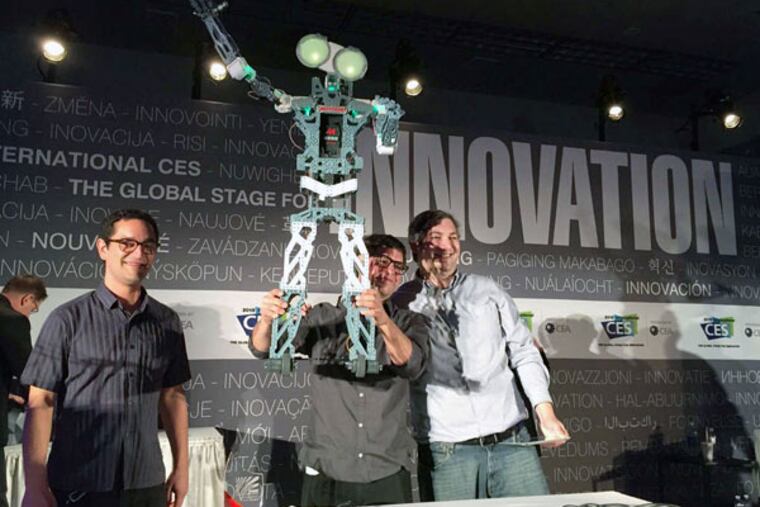Beginning entrepreneurs bring wares, dreams to CES
LAS VEGAS - The tech celebration that distracted some in this city last week from gambling and cavorting is best known as the Consumer Electronics Show. But for the energetic entrepreneurs who push inventions and start-ups here every January - more this year than ever - CES might as well be called the Field of Dreams.

LAS VEGAS - The tech celebration that distracted some in this city last week from gambling and cavorting is best known as the Consumer Electronics Show. But for the energetic entrepreneurs who push inventions and start-ups here every January - more this year than ever - CES might as well be called the Field of Dreams.
Their hope is that if they build it, customers will come, and with them some measure of success - whether they seek fortune, fame, or the satisfaction of improving other people's lives along with their own.
This year's crop of inventions is heavily seeded with powerful and inexpensive sensors that can turn just about anything into connected, gee-whiz technology. But just as in the past, most of their stories won't play out as imagined - and not always because an innovation fails.
Just ask Rafi Spero, cofounder a dozen years ago of Philadelphia's Neat Co., which makes hardware and software that increases the efficiency of businesses and home offices and reduces the burdens of paperwork.
Spero and the company he founded with his father, Les, are thriving now. Neat debuted a new partnership with HP just before the Las Vegas show, and another such deal is expected to be announced later this month. A single press event during CES has already netted more than half a dozen media mentions and 20 review-sample requests - though Neat's appearance last week on Celebrity Apprentice may have helped, too.
But Spero and Neat faced a rough few years, thanks largely to the Great Recession and financial collapse. The business took a million-dollar hit when CompUSA went into bankruptcy just after placing a large order. The Speros lost control to Edison Partners, the Lawrenceville, N.J., venture firm, and Rafi Spero left the business for three years, partly to take a yearlong backpacking trip across Southeast Asia.
Focused on strategic development since returning in 2013, Spero has an entrepreneur's-eye view of technology. He joined a small Neat team last week at CES, exploring the show between business meetings, and shared his perspective Thursday as the show ended.
Anyone walking the vast floor space at CES, which this year took up 2 million square feet at the Las Vegas Convention Center and half a dozen nearby hotels, can likely imagine how Darwinian market forces take their toll on many young companies.
Last year, for example, 20 companies showed 3-D printers at CES. This year their number topped 50 - as did the growing number of smaller companies crowding a new Smart Home Marketplace at the Sands Expo & Convention Center. Nearby CES's Eureka Park section counted 375 start-ups this year, compared with 220 a year ago.
Neat is hardly a start-up. Though it doesn't disclose sales, it has about 120 employees and a track record of growth. Neat's three scanner models are sold in more than 6,500 retail locations around the country, including Best Buy, Staples, and other office-supply chains, as well as on Amazon.
How did it get there? Like many of today's smart-home or connected-baby or -dog start-ups, it began with its founder seeing a problem that seemed worth solving.
Spero said he was working for a consulting firm that imposed a complex, paper-intensive process for his weekly expense reports. "My thought was, 'There's got to be a better way.' "
Teaming with developers and his father, a serial entrepreneur and former Wharton professor, Spero created that better way, embodied in a product that Neat still sells as its $149 Neat Receipts portable scanner. It has since been joined by the $379 Neat Desk, with special feeds for receipts, business cards, and larger documents, the $499 WiFi Neat Connect, and a cloud-based subscription service.
Spero and his colleagues at CES, executive vice president Michael Crincoli and vice president Chris Barbier, agree on one thing: Neat's patented software is the key to its success. It parses each document it scans, categorizes it, and then extracts key information, such as a receipt's date, vendor, and the sales-tax amount.
Optical character recognition makes every word searchable. But it's the parsing algorithms that allow the data to be directly imported into spreadsheets and other programs useful to people and businesses.
Spero says Neat likes to see itself as "the Apple of the scanner category," because, like Apple, it closely integrates its hardware and software to make the user experience as simple and elegant as possible.
Crincoli says Neat "created the category" it occupies. And even though Brother and Epson now offer scanners that look similar, he says, Neat's specialized software means that, at least for now, it's a niche that Neat mostly still owns.
The HP deal offers evidence he's right. The printer giant has built Neat's software into its new HP 8040 multifunction printer, and even added Neat's logo to the front of the machine.
Like Apple's products, the new machine commands a premium price - Spero says it sells for about twice the price of a comparable multifunction printer.
"We're the added value" - something he says "feels pretty good."
Las Vegas just hosted thousands of entrepreneurs who would likely welcome that measure of success, once they put the Field of Dreams behind them - till next year.